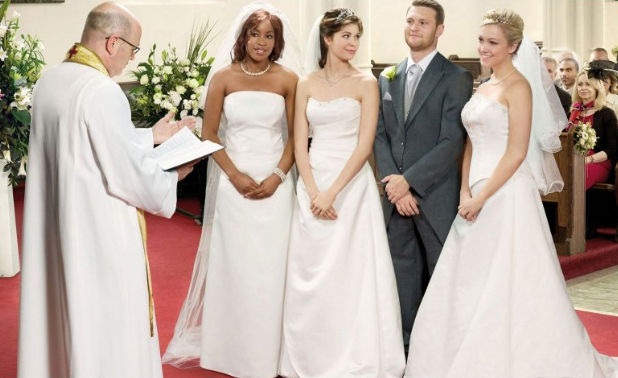Can a man have more than one wife? Most Christians today would answer “no,” but there are a few that say the Bible isn’t clear on this subject. And some bring up the historical fact that many of the Bible’s male characters had more than one wife. Abraham, Moses, and King Solomon are just a few examples. Some world religions today (or recently) — including a few sects of Christianity — have allowed for multiple wives in a marriage. So, what’s the deal, here?

People have approached me about this in the past and, just recently, I was watching one of my favorite television mystery programs, ‘Father Brown’, when he was asked if the Bible actually says a man cannot have more than one wife. The Catholic priest answered, “No, not exactly.” That is a paraphrase, because I can’t remember his exact words used in the BBC series, but that was what he implied. Anyway, that got me thinking and I believe a lot of people feel this way — in error, of course, just as was the crime-solving priest on television. Our study will shed light on this topic.
Wives and Concubines
Now, God does not approve of polygamy,1 but he allowed it. It was not part of his plan, but since mankind was going to do it anyway, God tolerated it, and made sure laws were enacted to protect the women involved. He knew humankind’s sinful nature and foresaw the harsh possibility of future relationships, so rules were established to safely compensate for the errors in taking more than one spouse.
Looking closely at certain Old Testament scripture proves that allowing polygamy wasn’t intended. For instance, in the very beginning, before the fall in the garden in Eden, it is stated, “Therefore a man shall leave his father and his mother and hold fast to his wife, and they shall become one flesh,” (Genesis 2:24, ESV).2
But, it didn’t take long before the first polygamist, the murderer Lamech, was recorded in scripture (Genesis 4:23–24). Later Esau, who despised his birthright, caused much grief to his parents by marrying two pagan wives (Genesis 26:34). And God forbade the kings of Israel to have many wives (Deuteronomy 17:17) and it caused much trouble when Israel’s kings disobeyed. Examples are the sibling rivalry between David’s sons from different wives (2 Samuel 13, 1 Kings 2), and the idolatry related to Solomon’s hundreds of wives (1 Kings 11:1-3).3
 Even the 10th commandment, “you shall not covet your neighbor’s wife” (Exodus 20:17), implies one wife. (Also see: Deuteronomy 5:14.) And the last book of the Old Testament holds a rebuke from God about unfaithfulness to one’s original wife (Malachi 2:14-16). God expects his people to have a high level of commitment in their marriages. Whether having more than one wife, or divorcing one wife for another, or other drama in marital relationships, people were tearing their marriages apart and God considered that as acts of violence.4 So, from the first book to the last book of the Old Testament, continued faithfulness to only one wife was God’s ideal arrangement.
Even the 10th commandment, “you shall not covet your neighbor’s wife” (Exodus 20:17), implies one wife. (Also see: Deuteronomy 5:14.) And the last book of the Old Testament holds a rebuke from God about unfaithfulness to one’s original wife (Malachi 2:14-16). God expects his people to have a high level of commitment in their marriages. Whether having more than one wife, or divorcing one wife for another, or other drama in marital relationships, people were tearing their marriages apart and God considered that as acts of violence.4 So, from the first book to the last book of the Old Testament, continued faithfulness to only one wife was God’s ideal arrangement.
Some may wonder why God blessed such people in various sinful marriage relationships, but just because God used a sinful situation to fulfill his plan does not mean that the action was righteous. As an example, Jesus’ own lineage is traceable back to Bathsheba,5 who was in a sinful relationship with King David (2 Samuel 11).
For those who don’t know that story, it is about the king walking on the roof of his home and spotting a beautiful young woman bathing below. This woman was Bathsheba, the wife of a military officer who was away at war. David gets the woman pregnant and, to keep her husband from finding out and causing trouble, has him killed.6
 Now, there are technical differences between a wife and a concubine. But, not to quibble, we will consider that the ancient wife was a free woman obtained, most probably, from her parents by contract. A concubine was a slave wife (or a servant wife or hand maid), obtained through capture, purchase, or business agreement. No matter how much someone argues about it, if the man had sexual relations with a live-in female, wife or slave, she was a partner and the arrangement would be considered one of polygamy.
Now, there are technical differences between a wife and a concubine. But, not to quibble, we will consider that the ancient wife was a free woman obtained, most probably, from her parents by contract. A concubine was a slave wife (or a servant wife or hand maid), obtained through capture, purchase, or business agreement. No matter how much someone argues about it, if the man had sexual relations with a live-in female, wife or slave, she was a partner and the arrangement would be considered one of polygamy.
In the Bible, a concubine was acquired as a secondary wife. “Her purpose was to provide a male heir in the case of a barren wife, to provide more children in general to enhance the family’s workforce and wealth, and to satisfy the man’s sexual desires. A concubine was endowed with rights and protections by Hebrew law,” but was not equal in status to the first wife.7
New Testament — New Rules
Although polygamy was common during all of biblical history, it occurred less and less as history progressed, especially after the Babylonian exile. And since polygamy was not the way our Creator meant marriage to be, the new Christian religion established more stringent rules concerning matrimony, to bring it back into alignment with God’s original purpose. As the Church grew, rules were established for the congregation and new leaders were chosen to guide the members according to Christ’s way.

Jesus recognized the problems of marriages, indicating that the Jews were an adulterous generation who chose to live outside of God’s rules and therefore, made their own. Just because the Jews tolerated polygamy, does not mean that God condoned it.8
In 1 Timothy 3:1-13 we read how all the people who were to take leadership in the Church were expected to act. And, concerning marriage, Paul, in this first letter to Timothy, specifically wrote: “Therefore an overseer must be above reproach, the husband of one wife,” (1 Timothy 3:2a). The apostle wasn’t suggesting that the person must be married, only that if he is, he must be married to only one wife. And his thoughts were that having a harlot or concubine with his one wife, was scandalous.9
One very important point is missed by many people; these rules were not just for the teachers, but for everyone. Christ’s expectation of the Church leaders was to set an example for all new Christians — the leaders were to demonstrate, by their own lifestyles, what all Christians were expected to achieve. A Christian marriage was not only between a man and a woman, but between only one husband and one wife.
This attitude is repeated throughout the New Testament (see Matthew 19:5; Ephesians 5:31; 1 Peter 3:7; Titus 1:6). And there is a model for marriage in the book of Mark when Jesus is asked about marriage and divorce, he repeats what is written in Genesis: “the two shall become one flesh” (Mark 10:8).
No Divorce Allowed?
When Jesus spoke about not being allowed to remarry after divorce, he was not talking about all divorces, but only unscriptural ones. This is because there are biblical grounds for some divorces. Even God spoke of himself as divorced from Israel (Jeremiah 3:8), because the nation was unfaithful. So unfaithfulness is a biblical reason.10
In the Old Testament era, divorce (Deuteronomy 24:1-4) was concerned most with the remarriage after the divorce, rather than the divorce itself.11 Fornication is mentioned as one reason for divorce, but that is a broad term for many kinds of sexual impropriety, including prostitution and extramarital intercourse. The rules were for women, as men could divorce a wife, but it did not work the other way around.
In New Testament times, that definition was expanded to include “any sexual behavior that deviates from accepted social and religious norms.”12 And Jesus made man and woman equal as regards adultery. But, in Matthew 5:31-32, and 19:9, Jesus taught that divorce was not forbidden when one of the partners had been guilty of sexual immorality. If divorced within biblical boundaries, there is no reason to forbid a remarriage.
Martial relationships are complicated and need examination from a Christian biblical perspective. But if a person is found innocent of breaking God’s law, there is no sin on their part. Remember, that sincere prayer should be involved in making any decisions. Remember, too, that God is not out to get you on a technicality.
The Marriage of the Lamb
In scripture, marriage is often used to describe the relationship between God and the followers of his law. “In the Old Testament, Israel is pictured, as in [the book of] Hosea, as the unfaithful wife of Yahweh who is destined to be restored in the future kingdom. In the New Testament, marriage is also used to describe the relationship between Christ and the church, but the illustration contrasts with the Old Testament, for the church is regarded as a virgin bride waiting the coming of her heavenly bridegroom (2 Corinthians 11:2).”13
 “The ‘Marriage of the Church’ is prophetically referred to by Jesus in the ‘Parable of the Marriage of the King’s Son’ (Matthew 22:1–14), and is consummated in Revelation 19:7–9.” More accurately, this event should be called the ‘Marriage of the Lamb’ as it will be the consummation of the plan of God for his Son, arranged before the foundation of the World (Ephesians 1:4).14
“The ‘Marriage of the Church’ is prophetically referred to by Jesus in the ‘Parable of the Marriage of the King’s Son’ (Matthew 22:1–14), and is consummated in Revelation 19:7–9.” More accurately, this event should be called the ‘Marriage of the Lamb’ as it will be the consummation of the plan of God for his Son, arranged before the foundation of the World (Ephesians 1:4).14
This marriage cannot take place until Christ’s second coming. “There have been many long betrothals, but Christ’s has been the longest on record.” He has been waiting for his Bride for about two thousand years.15
The Church had its origin at Pentecost and ends at the second coming of Christ (1 Thessalonians 4:14-17). The ‘saved’ who make up the Church, are those believers who fall between those two events. The Old Testament Saints (holy people) are the ‘Friends of the Bridegroom’ who are ‘called’ or invited as ‘Guests’. Angels and Heavenly Beings are the spectators.16 Jesus’ second coming is getting closer and closer. There is still a short time left to guarantee your place at the Marriage of the Lamb. Will you be there?
Read about this Marriage of the Lamb in verses 1–5 of Revelation, chapter 19. Part of that states: “Hallelujah! Salvation and glory and power belong to our God, for his judgments are true and just; for he has judged the great prostitute who corrupted the earth with her immorality, and has avenged on her the blood of his servants,” (Revelation 19:1-2). Verses 6–10 tells about the Marriage Supper of the Lamb, which follows immediately after the ceremony.
I’ve picked a song for the theme of this article and it is called ‘The Marriage Supper of the Lamb’. It is performed by The Hoppers, a Southern Gospel group from North Carolina (USA). Selected lyrics are below and the music video is listed in References & Notes.17
 “Welcome my beloved come and dine.”
“Welcome my beloved come and dine.”
And he’ll spread the welcome table,
And I’ll feast on heavenly manna,
And my brand new wedding garment I shall wear,
And I’ll cry, “Holy, Holy!”
And I’ll tell the redemption story,
Praise the name of the one who’s worthy,
And I’ll shout, “Hallelujah, Glory!”
As we celebrate the marriage of the Lamb.
Glory, Glory!
![]()
Copyright © 2020, Dr. Ray Hermann
OutlawBibleStudent.org
→ Leave comments at the end, after ‘References & Notes’.
You can see our basic rules for comments by clicking “The Fine Print” on the top menu bar. Your email address will NOT be published.
Reference & Notes
- Polygamy is one male husband and more than one female wife; polyandry is one female wife and more than one male husband.
“Polygamy”, (Wikipedia, Wikipedia Foundation Inc., 24 October 2020), https://en.wikipedia.org/wiki/Polygamy - Unless otherwise indicated, all scripture quotations are taken from The Holy Bible, English Standard Version (ESV), ©2001 by Crossway, a publishing ministry of Good News Publishers. The text has been used by permission. All rights reserved.
- Sarfati, Jonathan, “One man, one woman”, (Creation Magazine, 12 September 2009), vol. 31, no. 4, p. 12.
- Knowles, Andrew, The Bible Guide, 1st Augsburg books edition, (Minneapolis, MN: Augsburg, 2001), pp. 397–398.
- Patterson, Roger, “A Man of Many Wives”, (Answers in Genesis, 1 December 2008), https://answersingenesis.org/family/marriage/a-man-of-many-wives/
- Hermann, Ray, “HALLELUJAH — David & Bathsheba, Samson & Delilah, Music, Sex, and a Kitchen Chair”, (The Outlaw Bible Student, OBS, 24 June 2020), https://outlawbiblestudent.org/hallelujah-david-bathsheba-samson-delilah-music-sex-and-a-kitchen-chair/
- Hall, Emily, “What Is a Concubine? Why Did God Allow Men to Take Concubines in the Bible?” (Christianity, 9 May 2019), https://www.christianity.com/wiki/christian-terms/what-is-a-concubine-why-did-god-allow-men-to-take-concubines-in-the-bible.html
- Patterson, Roger, “A Man of Many Wives” (see above).
- Henry, Matthew, Matthew Henry’s Commentary on the Whole Bible, (Peabody, MA: Hendrickson Publishers, 1991), vol. 6, p. 690.
- MacDonald, William, Believer’s Bible Commentary: Old and New Testaments, (Ed.) Arthur Farstad, (Nashville: Thomas Nelson, 1995), p. 1221.
- Wenham, Gordon J., in Baker Encyclopedia of the Bible, (Grand Rapids, MI: Baker Book House, 1988), vol. 1, p. 475.
- Alexander, Ralph H., in Evangelical Dictionary of Biblical Theology, (Grand Rapids, MI: Baker Books, 1996), p. 184.
- Walvoord, John F., The Bible Knowledge Commentary: An Exposition of the Scriptures, (Wheaton, IL: Victor Books, 1985), vol. 2, p. 974.
- Larkin, Clarence, Dispensational Truth, or “God’s Plan and Purpose in the Ages”, (Philadelphia, PA: Clarence Larkin, 1918), p. 65.
- Ibid., p. 66.
- Larkin, Clarence, Rightly Dividing the Word, (Philadelphia, PA: Clarence Larkin, 1921), p. 47.
- The Hoppers, “The Marriage Supper of the Lamb”, CD/DVD: Let Freedom Ring; Gaither Music Group, 2 August 2012; Songwriter: Sylvia Canter, (Licensed to YouTube by BMI, Capitol CMG Publishing, others) – MUSIC VIDEO: https://youtu.be/dU4k3cC20Oc


The Judeo-Christian myth is a trap! Modern day Jewry is engrossed in Talmud and Halacha Pharisee religious law. Babylonian-Freemasonry is the only thing keeping it alive.
Although I do not believe the same way as you on this subject, there are others that do. And there is much written about such thoughts. I do, however, thank you for reading this article and for your comment.
This is certainly a rude awakening and never spoken of in traditional churches. The commandments speaks of only one wife. Certainly not fair to me, having remained alone to raise a child, never remarrying due to scripture.
A man shall leave his mother and father and take a wife …and goes on and the two shall become one. I never again found a place of worship, the opportunity to have a family or take part in church duties being a divorcee. My life pretty much ended.
Today, this brokenness lives with me. I see how it has affected my beloved daughter who does not believe in marriage or religion or even God. It’s not about what I could or did not do. A life long disappointment. Wren
Thank you for reading this article and for taking the time to comment. It is appreciated that you have felt free to share your thoughts and opinion. Your comment, along with a couple of emails expressing the same thought, led me to reexamine my own article.
In writing this study, I was trying to focus only on polygamy, rather than divorce, but I now see that I should have considered both. In that respect, I have updated the article by adding four paragraphs, all under the subheading “No Divorce Allowed?” I believe the added material gives biblical evidence for an accepted divorce, under biblical principles.
I pray for both you and your daughter. May she, one day, be enlightened. Have hope, I was an atheist at one time in my own live.